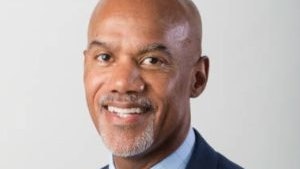As a Black man whose research focuses on Japan, Dr. Dyron K. Dabney says he has often felt like a “unicorn.”
“When I was in Japan, I had to accept the fact that I was going to be one of a few in this profession, but also in Japan, percentage wise,” says Dabney, an associate professor of politics and Japanese studies at Earlham College, a private liberal arts college in Richmond, Indiana.
 Dr. Dyron K. Dabney
Dr. Dyron K. Dabney
Dabney is director of Earlham’s Institute for Education on Japan (IEJ). In this role, he oversees and leads Earlham’s various Japan-related outreach activities, including its study abroad partnerships with schools such as Waseda University in Tokyo.
Dabney’s interest in Japan spans his entire life. He was first introduced to Japanese culture at age 11 through martial arts and karate, which were “quite professionally transformative or shaping” for his career.
Over time, his curiosity grew, leading him to take Japanese courses. He holds a B.A. in government and foreign affairs from the University of Virginia and a Ph.D. in comparative politics, with a focus on Japanese studies and American politics from the University of Michigan, Ann Arbor.
He carried his love for Japan into his larger career pursuits, intertwining it with his expertise in political science. In his classrooms at Earlham, and formerly at Albion College, Dabney says he introduced and exposed students to Asia and Japan through courses on contemporary Japanese and East Asian politics, political engagement, and election studies.
And throughout his teaching career, he has encouraged his students to study abroad.
“Dr. Dabney is well-known nationally for his work promoting global learning opportunities for both students from U.S. colleges studying in Japan and students from Japan studying in the U.S.,” says Dr. Roger Adkins, executive director of Earlham’s Center for Global Education. “Working with a broad network of campus-based contacts, program staff on both sides of the Pacific, program alumni and friends, and other colleagues across a few dozen U.S. institutions and in two locations in Japan, Dyron is an important figure in intercultural education and has contributed greatly to the educational outcomes for many hundreds of students in his time in the field.”
Given his role in leading Earlham’s Japan-related efforts, Dabney says that it was important for him to be “on the frontlines” of promoting his study abroad experience.
Study abroad as a practice, he says, has largely been shaped and populated by white scholars. He wants to change that. So, he chooses to be proactive in his advocacy, actively encouraging students to consider all the opportunities that studying abroad has to offer them.
“I had a mission of trying to expand that base of curiosity beyond the traditional students who were always interested in Japan,” Dabney says. “That meant expanding the base of opportunity to students of color, to non-traditional students, to first-generation students, to students for whom study abroad was not considered a possibility financially.”
But you can’t be what you don't see, Dabney says. A lack of awareness and information, utility for future careers, and perceived unaffordability often stand in the way of students of color considering and pursuing study abroad opportunities.
"Students perceive that finances would be an obstacle to study abroad,” says Dabney. “There are lots of funding opportunities now that didn't exist when I was curious about study abroad in high school and in college. That hurdle, that barrier is being lowered by many more scholarship opportunities at universities and colleges to create opportunity for students to study abroad.”
Dabney says that perception still rings true among students. “And so, they close that door before even giving it an opportunity," he says.
Despite these hurdles, Dabney strives to be an example, championing his cause. He adds that studying abroad allows students to expand their skills in critical thinking, global citizenry, cultural sensitivity, and communication with different people.
"I really firmly believe that one of the problems we have right now is a less reflective world that we live in now, one that is not as committed to being exposed, being uncomfortable, or being vulnerable and committing to truly trying to communicate and engage with other people,” he says. “Because of the absence of a commitment to wanting to get to know the other, [we] are where we are now, globally."
Even though higher education has actively increased efforts to promote diversity, equity, inclusion, and belonging — particularly in their study abroad programs — there remains a noticeable absence among Black men in the sector.
“I think there is a significant dearth of individuals, persons of color, in the profession of study abroad, particularly Black men in study abroad circles,” he says. “I could always count on both hands, and no more, the number of folks – Black men and sometimes Black men and women – who were in this profession, at least where I saw them attending conferences regularly."















